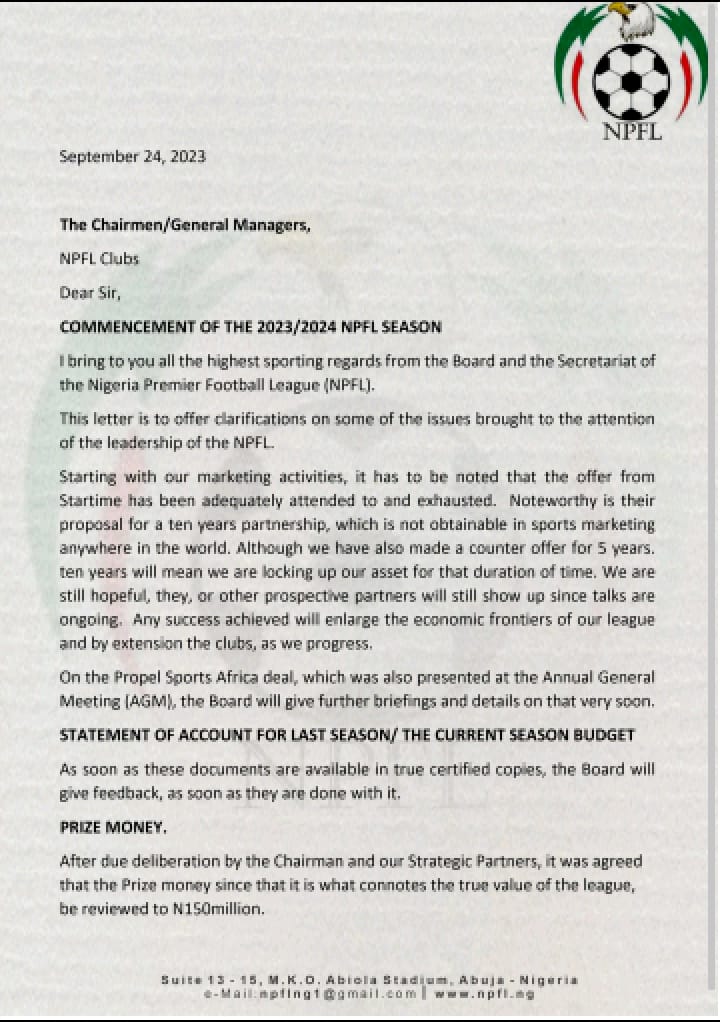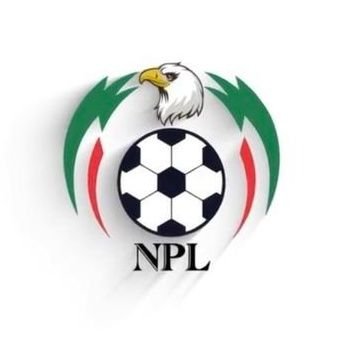“This writer don come again with the problems of the Nigeria Premier Football League.” A well-thought-out post on X by Adepoju Samuel opened the eyes of this writer to a lot of unanswered questions. But then what is wrong?
Recent developments and business decisions within the NPFL Board have sparked debate and concerns among clubs and stakeholders.
On Monday, the NPFL Board released a communication to the 20 clubs regarding the upcoming 2023/24 season, set to surprisingly kick off this weekend.

While this should have been a straightforward announcement, it has raised questions about transparency, inconsistency, and long-term business decisions.
One of the major issues that stirred controversy was the StarTimes bid. The proposal, reportedly valued at N1.5 billion annually for ten years. However, the NPFL Board refused to share financial details with the clubs and the general public, raising concerns about transparency and the management of league finances.
The NPFL Board’s rejection of the StarTimes 10-year partnership offer was based on an argument that a ten-year deal is not in line with global sports marketing standards. However, this claim was challenged by Adepoju Samuel.
Comparisons were drawn to Major League Soccer (MLS) in the United States, which signed a ten-year broadcasting deal with Apple. A little research by this writer shows that even FIFA awarded Fox Sports and Telemundo the rights to broadcast the World Cup in the United States from 2015 to 2026, that is for 11 years. Most recently, the NFL signed a 10-year deal with various broadcasters, including CBS, NBC, Fox, and Amazon.
This contradiction raised questions about the NPFL Board’s understanding of international standards and the reasoning behind their decision.
The refusal to consider a long-term deal also leaves a lot of questions unanswered. A lengthy partnership could offer the NPFL much-needed financial stability, which has been elusive in the past.
The NPFL Board’s statement that a ten-year deal would lock up assets for an extended period brought the spotlight to another issue raised by Adepoju Samuel —the GTI deal. It was revealed that the NPFL signed a ten-year partnership with GTI. This inconsistency raises eyebrows, leading many to question the clarity and fairness of the GTI agreement.
One issue that has been a subject of concern is the GTI deal, which may be tagged as “modern slavery” of the NPFL. Questions about the transparency and clarity of the GTI agreement now linger, and this writer calls for a review and clarification of this ten-year deal.
The recent developments within the NPFL Board have highlighted the pressing need for transparency, consistency, and sound business decisions in Nigerian football.
It’s essential for the NPFL to foster trust and cooperation among its stakeholders, particularly the clubs, by openly sharing financial details and being clear about its decisions. Transparency is the foundation of any successful partnership, and the league should prioritize clear and honest communication to ensure everyone is on the same page.
Regarding the StarTimes bid, while caution is necessary, an outright rejection of a potentially beneficial ten-year deal may not be in the league’s best interest. Instead, the NPFL Board should consider negotiating terms that align with their long-term goals while safeguarding their assets. A well-structured, long-term partnership could offer the league the financial stability it desperately needs.
Hopefully, as my late grandfather once said, e go better one day. Until then, we continue to wish.
